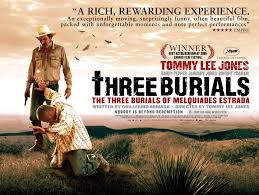The Three Burials of Melquiades Estrada

The Three Burials of Melquiades Estrada (2005), is a Post/Neo Western movie, directed and acted by Tommy Lee Jones. It tells the story of Melquiades Estrada, a Mexican illegal migrant who enters Texas in search of a job and a new life. Soon enough, Melquiades and Pete Perkins (Tommy Lee Jones), become friends and work partners. However, this new and unfiltered friendship is soon tested when Melquiades is killed and Pete is forced to find his friend’s killer and to fulfill the promise of burying Mel in his home town in Mexico.
I think that Three Burials is a post/Neo Western movie because it retains elements of conflict of the traditional Western genre movie such as good versus evil (cowboys’ vs Indians/Mexicans), freedom versus settlement, solitude versus cooperation and wild versus civilization. Nevertheless, other new and interesting elements are brought into the mix of Three Burials as a way to reinvent the Western genre and to challenge pre-established social and cultural norms impose by society which are based on stereotypes the ‘other’ as foreigner and evil. For instance, in the case of The Three Burials of Melquiades Estrada, both Pete Perkins as well as the audience are forced to come to terms with the concept of friendship, honor, ‘the other’ and traditional family values. As we have seen in previous Western themed movies such Treasure of the Sierra Madre (1948) and The Mark of Zorro (1920), movies have being responsible for constructing pre-established notions of how society should look-like and where white American cowboys redeemed themselves in foreign lands (Mexico in the case of Sierra Madre). This is to say that, some values are more important than others: honor, solitude, tradition, and nature. In the case of The Three Burials of Melquiades Estrada, the West belongs not only to the white American cowboys of Texas but it opens a cultural and social space for Mel himself to enter this Western world as a baquero just like his counterparts. Here, the US-Mexico border, is a fluid zone where identities are recognized but allowed to coexists, cultural hybridity is present, and spaces take different meaning and values. Among this fluid Mexico-US border area, Pete’s mission to find the killer of his friend and later his mission to bury him in Mexico also challenge the notion of the typical Western movie.
The value and meaning of true friendship is highly explored in Three Burials. For once, the way in which Pete welcomes and allows Mel to work in his Texan ranch and to become his friend, shows that the view of the Mexican as the ‘other’ does not apply in the same context as it did in movies such as Zorro or Sierra Madre. For example, there is a clear intention by Pete to carry out Mel’s wishes of being buried in his homeland and what he does to accomplish this is what makes the movie interesting to analyze. Not only does Pete find out who Mel’s murderer is but forces Officer Norton to carry Mel’s dead body through the US-Mexico border, across the desert (on a mule’s back) and buries him in his ‘home’ town. Hence, showcasing the overall sense of dedication and friendship for his Mexican friend and demonstrating loyalty for others beyond social and cultural boundaries. For this reason, Perkin’s reason is not only driven by his desire for vengeance but instead love and solidarity for his friend are paramount drivers of this post-Western film.
The difference among the importance of family values giving in The Three Burials of Melquiades Estrada, deserves close attention. In fact, the way in which Officer Norton’s house hold is presented vastly contrasts that one of Mel’s family ideas or among those of Mel and Pete’s, who in some respect has become a sort of acquired family for Mel’s. Officer Norton family is in crisis. Norton and his wife seem to be at lost (bored in a new city and lost in this new job). Instead, Mel’s family values are around his ‘wife’ and children and his relationship with Pete are portrayed as good, honest and carefree. Pete cares a lot for Mel’s, so much so that he introduces him the companionship of Lou Ann Norton, Officer Norton’s wife, to be his romantic partner. It is like if Pete is a father figure to Mel and race, origin, and blood does not matter to him but what really matters is his friend’s happiness and well-being. What transpires in the end and really matter for Pete is to restore the respect and dignity of his good friend Mel. Hence, the three consecutive burials lead Pete to force Mike Norton to take a road trip to Mexico so they can give Mel a proper burial.
To finalize, Lou Ann Norton and Mel find their own way to be happy in the motel room. It is here where Lou Ann is the happiest. It is in the motel room, among this liminal space, where she escapes being raped by her husband the border patrol Officer. It is in here, the motel room, where Lou Ann takes charge of her destiny and help ease Mel into being himself. Language does not matter in this motel room liminal space. Hence, music, television and dancing become excuses to get to know each other better. Sex is not necessary. Only their intimacy for one another is what allows them to escape their realities and to forget their sorrows. For this reason, Lou Ann and Mel brake the conventions of family values in the motel room and allow themselves to be happy for a while before returning to their day-to-day spaces. In the case of Lou Ann is her role as bored house-wife and for Mel is an illegal cowboy in Texas.
Lastly, it is important to mention that Lou Ann escapes her stagnated reality when she leaves the Texan town of Van Horn after her husband goes missing. On the other hand, Mel only escapes his illegal and foreign condition when he is mistakenly and wrongly killed by Officer Mike Norton. Hence, choice of action versus fatal destiny are put forward in the movie as circumstantial themes which conducts the action within the movie.

